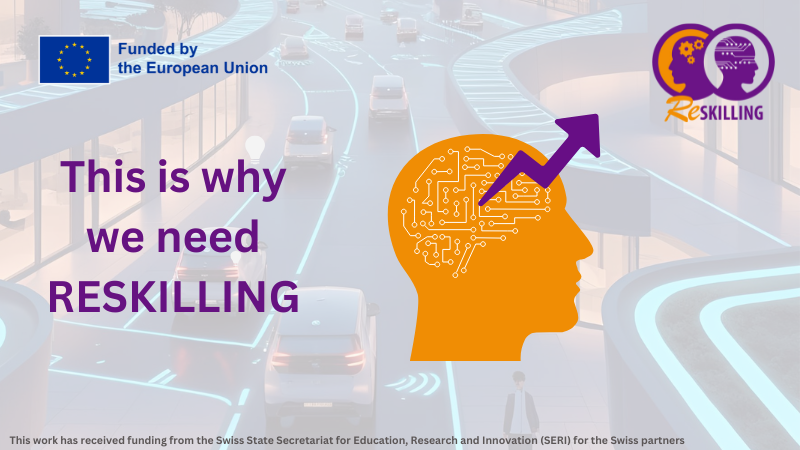Why is RESKILLING vital to empower Europe’s transport workforce in the CCAM era?

Transport is vital to Europe’s economy and daily life, contributing 5,2% to the EU’s GVA[1]. The transport and storage services sector in the EU-27 employs around 10.5 million people, some 5.3% of the total workforce - making its workforce a highly valuable asset! As the EU transitions towards smarter, greener mobility, the success of this transformation hinges on the active involvement and support of transport workers.
However, many parts of the transport industry face difficult working conditions, an ageing workforce, and growing labour shortages. The rise of Cooperative, Connected and Automated Mobility (CCAM) technologies adds another layer of complexity, offering both risks and opportunities. Automation raises concerns over job losses - particularly in sectors like freight and driving - while also opening doors for new, more qualified roles in intelligent transport systems (ITS), customer services, and tech-oriented support. These changes could make the sector more appealing to currently underrepresented groups, including women, young people, seniors, and persons with disabilities.
While most research focuses narrowly on the impacts of automation on transport jobs, there is an urgent need to take a broader view. Future workforce development must look beyond driving roles to consider the entire CCAM value chain and all roles involved in providing a full service. This includes education, organisational transformation, and labour market adaptation - especially in freight and logistics. The transition must be inclusive, offering good working conditions, continuous reskilling, and meaningful job opportunities. Social innovation is key, and a deep understanding of societal and environmental needs will be essential in shaping sustainable solutions.
The RESKILLING project, funded by Horizon Europe, adopts a social innovation-driven approach to ensure that mobility solutions involving CCAM technologies benefit people as much as systems. While technological change is often shaped by governments and experts, RESKILLING puts the workforce, the people, at the centre. It maps all professions linked to CCAM services for both people and goods, accounting for different social contexts and regional specificities. Crucially, it promotes a SSH (Social Sciences and Humanities)-based approach across all project phases.
At the core of the project lies the RESKILLING Co-Innovation Framework, designed to facilitate co-creation between professionals, industry actors, policymakers, and beneficiaries. This collaborative method ensures that solutions are not only technically viable but also socially fair and tailored to real-world needs.
RESKILLING aims to validate and implement a comprehensive, inclusive strategy for adapting the mobility sector to CCAM deployment. It will provide new services and tools for analysing the socio-economic impacts of automation, supporting businesses and workers in seizing emerging opportunities while addressing potential drawbacks. The project also emphasises innovative business models, tailored training pathways, and mechanisms to upskill the workforce. Scalability, transferability, and replication are built into the approach to ensure its relevance across different European regions.
By promoting (or providing) knowledge-based solutions fostering skills transitions and facilitating dialogue among all stakeholders, RESKILLING aspires to contribute to a socially innovative CCAM ecosystem - one that generates not just technological breakthroughs, but real, lasting benefits for society.
“The challenges of automation, new technology and the future of work are some of the most important facing workers today. For trade unions, we must be strong enough to be able to shape change. Understanding potential impacts and opportunities for our members and preparing the appropriate responses are key. This includes enhancing our engagement with industry partners and identifying appropriate education, training and capacity-building needs of our members and workers in the transport chain. Transport workers of today and tomorrow must be equipped with the required knowledge, skills and expertise for the jobs of tomorrow..” Stephen Cotton, General Secretary, International Transport Workers’ Federation
[1] European Commission (2024). Statistical Handbook – EU Transport in Figures